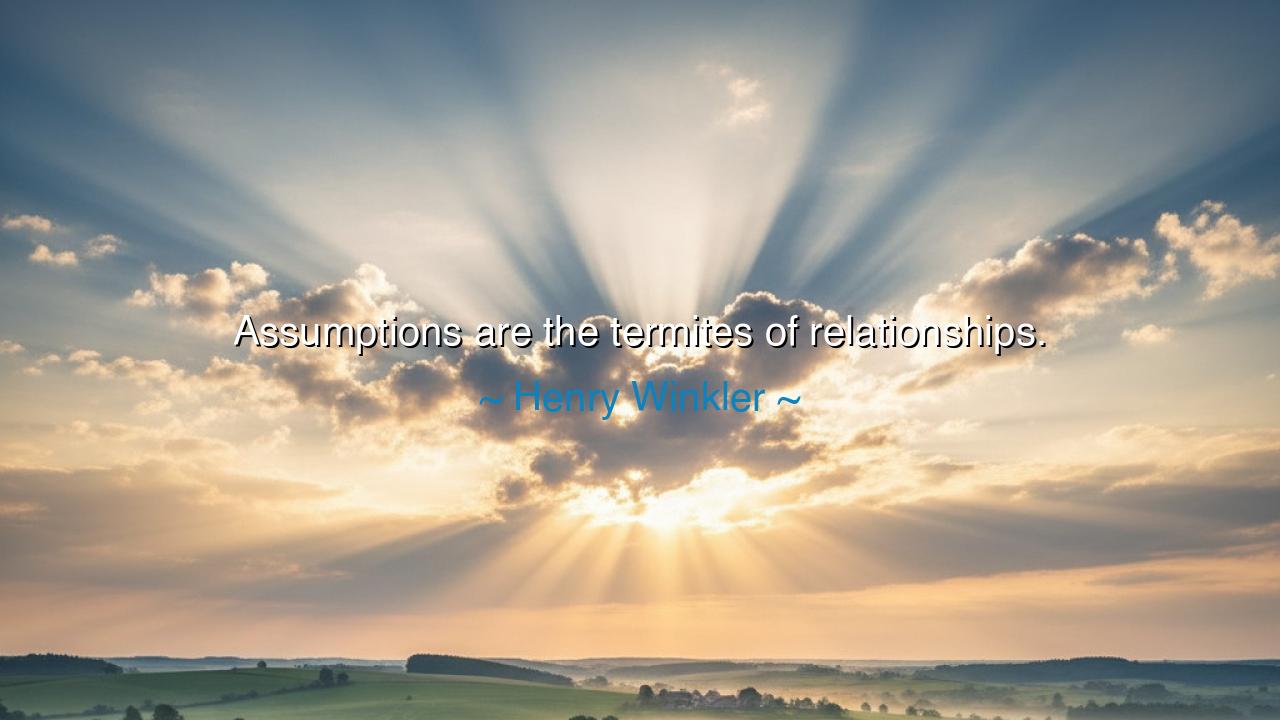
Assumptions are the termites of relationships.






Hearken, O seekers of understanding and the delicate art of human bonds, to the words of Henry Winkler, the sage of perception and connection: "Assumptions are the termites of relationships." In this utterance lies the ancient truth that unspoken beliefs and unchecked interpretations gnaw silently at the foundation of trust and intimacy. What is presumed without inquiry often corrodes the bonds of affection and understanding, invisible yet potent in its destruction.
In the theater of mortal companionship, many fall prey to the quiet decay of assumptions, believing to know the intentions, thoughts, or feelings of another without dialogue. Winkler illuminates that misjudgment grows in silence, weakening the ties of friendship, love, and kinship. Relationships, like timber, are strongest when built on clarity, trust, and communication; unchecked presumptions hollow the heart of connection, leaving it brittle and vulnerable.
Consider the life of Abraham Lincoln and his generals during the Civil War, whose relationships were often strained by assumptions and unspoken judgments. Lincoln’s skill lay not only in strategy but in his willingness to question presumptions, to listen carefully, and to clarify intentions. Where assumptions might have festered and undermined trust, his vigilance and communication preserved unity and strengthened the bonds necessary to guide a fractured nation to victory.
The ancients, who chronicled the wisdom of statesmen, warriors, and families, understood that misinterpretation and presumption are hidden agents of ruin. The philosopher counseled inquiry before judgment, the elder guided youth to speak clearly, and the poet chronicled the folly of believing without knowing. In all enduring relationships, vigilance against assumptions is the key to preservation, just as the craftsman protects timber from termites through care and attention.
Yet this teaching carries subtle depth: to guard against assumptions requires humility, patience, and active engagement. Winkler’s insight urges the seeker to question inner narratives, to seek understanding, and to communicate openly. Relationships are nourished not by conjecture but by attention, presence, and a willingness to see the other as they are, rather than as one imagines them to be.
Therefore, O children of the heart and of discernment, let this teaching lodge in your souls: assumptions, like hidden termites, may silently consume the strength of bonds, yet they may be thwarted by vigilance, curiosity, and clear communication. In embracing dialogue, inquiry, and understanding, one fortifies the structures of trust and intimacy, honoring the timeless wisdom of the ancients and cultivating relationships that endure the tests of time and human imperfection.






MNMK Nguyen
This quote really hits home because assumptions can lead to so many problems, whether it’s in romantic relationships, friendships, or work. It’s like the old saying, 'don’t assume, ask.' But even when we try to avoid assumptions, they can sneak in. How do you think we can stop ourselves from assuming and foster more clarity and understanding in our relationships?
NNYen nhi Nguyen
What an interesting perspective on relationships! It’s easy to make assumptions, especially when we think we know the person so well. But those little, unchecked assumptions can quietly erode trust. This makes me wonder, how can we learn to communicate better and avoid the pitfalls of assumptions? Is there a way to train ourselves to ask questions rather than assume?
GDGold D.dragon
This quote is such an insightful reminder that assumptions can slowly undermine even the strongest relationships. We assume we know what others want, think, or feel, but that doesn’t always align with reality. What are some ways you think we can challenge our own assumptions in relationships and make sure we’re truly listening to each other?
ATNguyen Ngoc Anh Thu
Henry Winkler’s quote strikes a chord because it’s so true. Assumptions can be damaging, often without us even realizing it. It’s easy to jump to conclusions or fill in the gaps with our own thoughts, but those assumptions can create friction and distrust. Have you ever had a situation where assumptions affected your relationship with someone? How did you handle it?
QHNguyen Quang Huy
I love the imagery here. The idea that assumptions slowly eat away at relationships is so powerful. It makes me think about how often we might think we know what someone else is thinking or feeling without actually asking. Do you think we all tend to make assumptions, or is it something that only happens in certain situations?